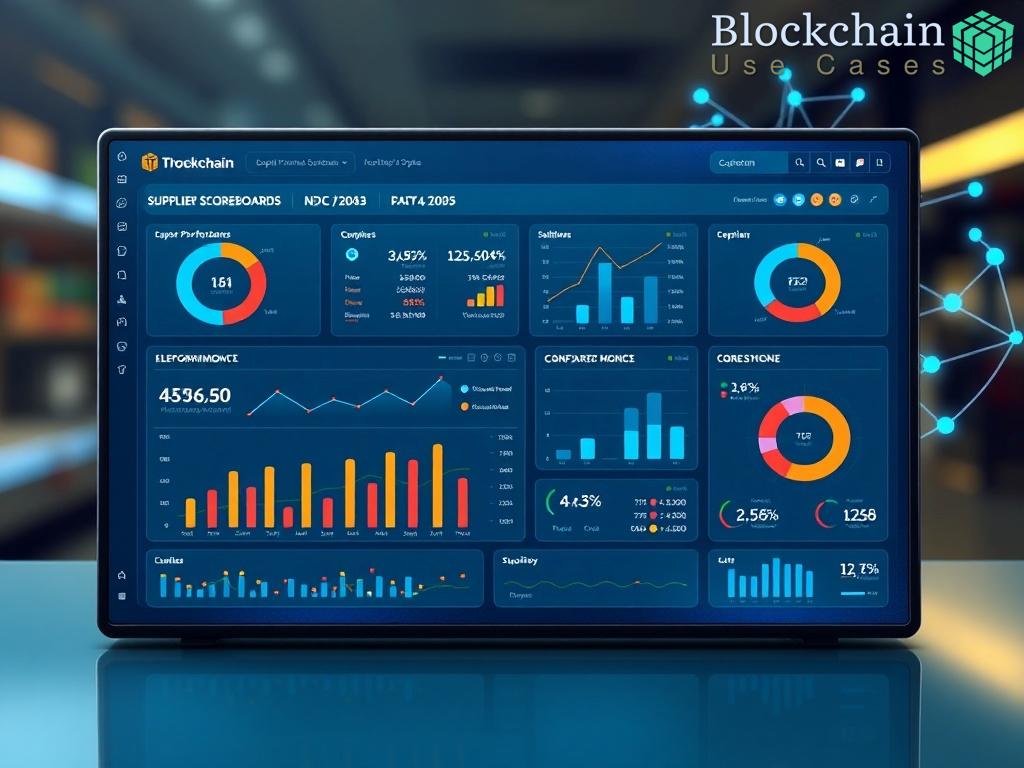Enhancing Transparency in Supplier Performance

In the evolving landscape of supply chain management, transparency has emerged as a crucial factor in enhancing supplier performance. The advent of blockchain technology offers a robust solution to increase accountability and visibility. By utilizing a decentralized ledger, organizations can record supplier interactions in real-time, fostering an environment of trust and collaboration. This shift not only improves relationships with suppliers but also streamlines operations with measurable performance metrics.
One of the standout features of blockchain technology is its ability to provide real-time data tracking. Suppliers can be monitored continuously, ensuring that performance metrics are not just recorded but are also readily accessible. This capability allows businesses to respond swiftly to any discrepancies or performance issues. The following list highlights some key performance metrics that can be effectively managed through blockchain:
- Delivery Timeliness
- Quality of Goods
- Compliance with Standards
- Cost Efficiency
- Supplier Responsiveness
By leveraging these metrics, organizations can make informed decisions, foster healthy competition among suppliers, and ultimately enhance the overall supply chain performance.
Another significant advantage of blockchain is its ability to create immutable records. Each transaction is securely recorded, ensuring that historical data is preserved and cannot be altered. This feature is particularly beneficial for audits and compliance checks, as it provides a verifiable trail of supplier performance. Stakeholders can be confident in the data presented, leading to improved decision-making processes and stronger supplier relationships.
Real-Time Data Tracking and Analytics
In an age where speed and accuracy are paramount, real-time data tracking and analytics facilitated by blockchain technology are revolutionizing how organizations manage supplier performance. Gone are the days of relying on retrospective reports; businesses can now access live data streams that reflect their suppliers’ performance metrics as they happen. This immediate access not only enhances operational efficiency but also empowers decision-makers to act swiftly and decisively.
The ability to glean insights from real-time data allows organizations to adapt their strategies on the fly. Unlike traditional methods that often suffer from delays and inaccuracies, blockchain provides a continuous flow of information that can be analyzed for trends and anomalies. By integrating advanced analytics tools with blockchain, companies can transform raw data into actionable insights.
To fully leverage the benefits of real-time data tracking, organizations can focus on several specific Key Performance Indicators (KPIs) that reflect supplier performance. The table below illustrates these KPIs and how they can be monitored through blockchain technology:
| Key Performance Indicator | Description | Benefits of Tracking |
|---|---|---|
| Delivery Timeliness | Measures the punctuality of supplier deliveries against agreed timelines. | Enhances planning accuracy and reduces inventory costs. |
| Quality of Goods | Assesses the condition and compliance of goods upon receipt. | Minimizes returns and strengthens customer satisfaction. |
| Compliance with Standards | Tracks adherence to industry and regulatory standards. | Reduces risk of penalties and fosters a culture of quality. |
| Cost Efficiency | Analyzes the cost-effectiveness of procurement processes. | Enables budget optimization and maximizes ROI. |
| Supplier Responsiveness | Evaluates the speed and effectiveness of supplier communication and action. | Improves collaboration and enhances supplier relationships. |
By focusing on these KPIs, organizations can create a comprehensive dashboard that presents a holistic view of supplier performance. This data-driven approach not only facilitates better supplier management but also contributes to a more resilient and agile supply chain.
Automating Compliance and Auditing Processes

As supply chains grow increasingly complex, the pressure on organizations to maintain compliance and conduct thorough audits is mounting. Blockchain technology serves as a pivotal tool in automating these processes, thereby enhancing operational efficiency and reducing human error. By creating a secure, transparent framework, organizations can streamline compliance checks and audits, ensuring that supplier activities align with established standards and regulations.
Utilizing blockchain technology allows organizations to automate compliance management through smart contracts. These self-executing contracts automatically enforce compliance with predefined criteria, ensuring suppliers meet their obligations without the need for manual oversight. This not only saves time but also mitigates the risks associated with human error. By integrating automated compliance tools, businesses can effectively monitor supplier activities in real time, leading to quicker identification of non-compliance issues.
Auditing supplier performance is essential for maintaining quality and compliance throughout the supply chain. Blockchain’s immutable record-keeping feature facilitates comprehensive audits, as every transaction is securely documented and cannot be altered or deleted. Auditors gain access to a reliable history of supplier interactions, which simplifies the auditing process and enhances transparency. This level of accessibility ensures that organizations can conduct both internal and external audits with confidence, knowing that the data is accurate and trustworthy.
By automating compliance and auditing processes through blockchain technology, organizations can experience a multitude of benefits. The following list outlines the key advantages:
- Increased Accuracy: Automated systems minimize the potential for human error, ensuring that compliance checks are accurate and reliable.
- Cost Efficiency: Streamlined processes reduce the resources required for compliance and auditing, resulting in significant cost savings.
- Real-Time Monitoring: Continuous tracking of supplier performance allows organizations to identify and address compliance issues promptly.
- Enhanced Accountability: Immutable records foster a culture of accountability among suppliers, encouraging adherence to standards.
- Improved Audit Readiness: With readily available data, organizations can prepare for audits with minimal disruption to operations.
As blockchain technology continues to revolutionize supply chain management, the automation of compliance and auditing processes stands out as a game-changer. Organizations can leverage these advancements to enhance supplier relationships, fortify compliance frameworks, and ultimately drive performance improvements across the board.
Facilitating Collaborative Supplier Relationships
In an era where collaboration is pivotal for success, blockchain technology is redefining how organizations engage with their suppliers. By fostering transparent communication and shared accountability, blockchain paves the way for more robust partnerships that benefit all stakeholders involved. This innovative approach not only enhances supplier performance but also cultivates trust, ultimately leading to a more resilient supply chain.
One of the most significant advantages of blockchain is its capacity to provide suppliers with immediate access to performance metrics and operational data. By empowering suppliers with real-time insights, organizations can create a more inclusive environment where suppliers feel valued and informed. This transparency encourages active participation, allowing suppliers to adjust their performance based on up-to-date information. As a result, organizations can expect improved responsiveness and engagement from their suppliers.
The decentralized nature of blockchain facilitates the sharing of information between organizations and their suppliers. By allowing both parties to access the same data, organizations can eliminate discrepancies and misunderstandings, fostering a culture of mutual trust. This collaborative atmosphere not only strengthens relationships but also enhances problem-solving capabilities. When suppliers are on the same page as their partners, they can work together to address challenges more effectively, leading to improved overall performance.
To fully leverage the benefits of blockchain in facilitating supplier relationships, organizations should adopt the following key strategies:
- Engagement: Regularly communicate performance expectations and updates to suppliers through the blockchain platform.
- Feedback Loops: Implement mechanisms for suppliers to provide feedback on processes and performance metrics, promoting a two-way dialogue.
- Joint Problem Solving: Utilize shared data to collaboratively address challenges, fostering innovation and agility within the supply chain.
- Incentivization: Introduce incentive structures that reward suppliers for achieving key performance indicators collectively.
By integrating these strategies, organizations can create a collaborative environment that not only drives supplier performance but also enhances the overall effectiveness of the supply chain. As blockchain continues to evolve, it will undoubtedly play a crucial role in shaping the future of supplier relationships, paving the way for more strategic partnerships.
Integrating Smart Contracts for Performance Incentives
The integration of smart contracts within blockchain technology is reshaping the landscape of supplier performance management. By automating agreements and ensuring compliance through coded terms, organizations can create a framework that incentivizes suppliers to meet or exceed performance expectations. This innovative approach not only streamlines operations but also fosters a culture of accountability and motivation among suppliers.
Smart contracts can be configured to automatically trigger performance incentives when suppliers achieve specific Key Performance Indicators (KPIs). This capability allows organizations to align supplier objectives with their own, promoting a collaborative environment where success is shared. With clear metrics established, suppliers have a tangible goal to strive for, bolstering their commitment to quality and efficiency.
Implementing smart contracts as part of the supplier performance management process offers a multitude of advantages. Below is a list highlighting key benefits:
- Automation: Reduces the administrative burden by automating compliance checks and incentive payments.
- Transparency: Ensures that all parties have access to the same data, fostering trust and reducing disputes.
- Real-Time Adjustments: Allows for immediate adjustments to contracts based on performance metrics, enabling agile responses to challenges.
- Enhanced Performance: Motivates suppliers to maintain high standards as their rewards are directly tied to their performance.
- Cost Efficiency: Minimizes the costs associated with manual tracking and enforcement of agreements, resulting in better resource allocation.
By harnessing smart contracts, organizations can cultivate an environment where suppliers are not just participants but active partners in the supply chain. Establishing collective goals reinforces the idea that both parties benefit from high performance. As suppliers see their efforts rewarded promptly and fairly, they become more engaged, ultimately leading to improved outcomes for all stakeholders involved.





